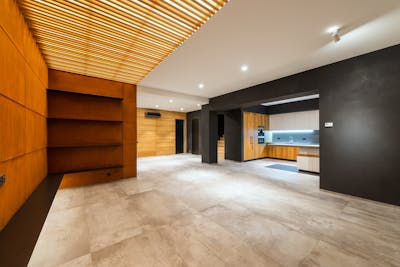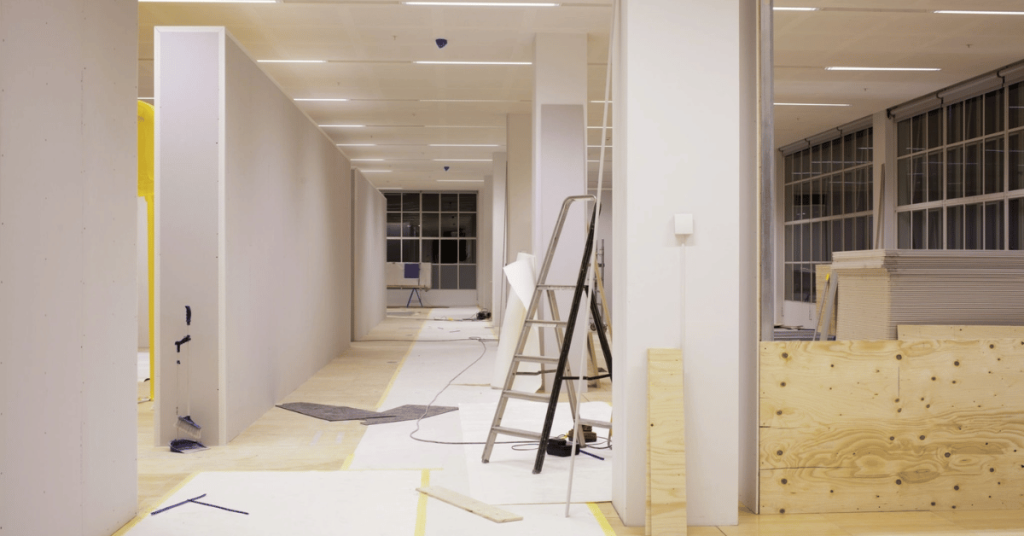6 Things to Consider Before Renovating a Commercial Space
6 Things to Consider Before Renovating a Commercial Space: Renovating a commercial space is far more than a cosmetic upgrade—it’s a strategic decision that requires careful planning and attention to detail. A commercial space renovation involves reimagining and overhauling a workspace to meet evolving business needs and industry standards. Given its complexity and impact, this process demands a thorough understanding of all the factors at play.
In this blog, we’ll explore why careful planning is essential before embarking on a commercial renovation project. With the right knowledge, you can make informed decisions and transform your workspace into a space that drives growth and success. Here are 6 things to consider before renovating a commercial space.
6 Things to Consider Before Renovating a Commercial Space
1. Assessing Renovation Needs
Before beginning any commercial building renovation, it’s essential to conduct a thorough assessment of your needs. Start by asking yourself critical questions: What issues exist in the current setup? What obstacles are preventing optimal functionality? By identifying these factors, you can create a renovation plan that addresses real challenges instead of focusing on superficial upgrades. Whether it’s outdated technology, inefficient layouts, or a lack of modern amenities, pinpointing areas in need of improvement ensures your efforts are both purposeful and impactful.
Every renovation should aim to achieve more than just aesthetic appeal. Clearly defining the objectives and goals behind the transformation is crucial. Are you striving to foster collaboration, enhance energy efficiency, or modernize your brand image? Establishing a clear purpose provides a guiding framework for decision-making throughout the project. Aligning every aspect of the renovation with these objectives ensures a cohesive and meaningful result that goes beyond surface-level changes.
A comprehensive analysis of your commercial space is non-negotiable. Take stock of the existing infrastructure, note spatial limitations, and identify opportunities for expansion or optimization. This process should go deeper than surface observations—evaluate the structural integrity of walls, the efficiency of plumbing, and the reliability of electrical systems. Such a meticulous examination lays the groundwork for a renovation that prioritizes both functionality and longevity, creating a space built to withstand the test of time.
Commercial spaces are inherently complex, with distinct zones serving different purposes. Use your analysis to identify the specific areas that require attention. Perhaps the office layout hampers teamwork, or the reception area fails to create a welcoming impression. By targeting these key zones, you can concentrate your efforts and resources where they will have the greatest impact. This strategic approach transforms your commercial space into a cohesive, functional environment tailored to your business’s unique needs.
2. Budgetary Considerations
Planning a renovation or remodeling a commercial space? Crafting a realistic budget isn’t just a step in the process—it’s the foundation of a successful project. Effective budget planning begins with assessing the total costs, including materials, labor, permits, and professional fees. By taking a thorough approach, you can avoid overextending your finances.
Precision is key when managing your budget. Break down costs into detailed categories to clearly understand where every dollar is going. This level of clarity helps avoid financial surprises and enables smarter decision-making. Start by identifying the must-haves for your project, ensuring they are prioritized, and then consider adding the “nice-to-haves” if your budget allows.
Renovation projects often come with unexpected surprises—whether it’s hidden structural issues or unforeseen compliance hurdles. That’s why setting aside a contingency fund is essential, not optional. By allocating a portion of your budget to cover unexpected expenses, you can keep the project on track even when challenges arise.
Sticking to a budget doesn’t mean sacrificing quality. Instead, it’s an opportunity to be strategic. Explore cost-effective alternatives, such as sourcing materials from reputable yet affordable suppliers or utilizing innovative technologies to improve efficiency. By optimizing your resources, you can achieve high-quality outcomes while maximizing every dollar spent. This approach ensures the success and sustainability of your commercial renovation project without unnecessary overspending.
3. Compliance and Regulations
Compliance with building codes and regulations is a critical aspect of commercial renovations, yet it’s often underestimated by business owners. Before breaking ground or drafting initial designs, it’s essential to review the codes and regulations governing your space. Each municipality has its own rules, and non-compliance can lead to expensive delays or legal issues. Failing to secure the necessary permits may even result in authorities requiring you to reverse all renovations, wasting time and resources.
Navigating the bureaucratic process involves more than just paperwork—it requires coordination with local authorities, submitting detailed plans, and waiting for approval. While this may seem tedious, obtaining the proper permits is vital for ensuring both legal compliance and safety. Skipping this step risks project delays, fines, or a complete shutdown of your renovation efforts.
In today’s world, inclusivity is not only a legal requirement but a social responsibility. Assess your renovation plans to ensure they align with accessibility standards, creating a welcoming environment for everyone. From wheelchair access to sensory-friendly features, adhering to these guidelines not only keeps you legally compliant but also demonstrates a commitment to fostering an inclusive, modern space that reflects shared values.
You Might Also Like: 10 Common Home Renovation Mistakes to Avoid
4. Hiring the Right Professionals
Experience is the cornerstone of any successful commercial renovation. When choosing contractors or architects, prioritize professionals with a proven track record in similar projects. Leverage referrals, online reviews, and industry accolades to ensure you’re selecting a team with the expertise to deliver exceptional results. Seasoned professionals not only address challenges with ease but also offer valuable insights that can elevate the quality of your project.
A contractor’s portfolio speaks volumes. Always request and carefully review samples of their past work to assess their skills, creativity, and versatility. This visual evidence provides a clear picture of their capabilities. Additionally, reach out to previous clients for references to gain firsthand knowledge of their reliability and professionalism. Conducting a thorough review of portfolios and references ensures you’re making an informed decision.
Effective communication is the foundation of a seamless renovation process. From the outset, establish open and transparent communication channels with your team. Clearly define expectations, timelines, and potential obstacles to facilitate alignment. A collaborative dialogue encourages the free flow of ideas, ensures issues are resolved quickly, and fosters a cohesive working relationship that keeps the project on track.
5. Timeframe and Scheduling
Time is crucial in any project, especially commercial renovations. A well-planned schedule not only keeps your renovation on track but also minimizes disruptions to your business operations.
Creating a realistic timeline is essential for a successful renovation. Break the project into clear phases, each with specific tasks and milestones. Consider the complexity and scope of each phase to establish achievable deadlines. While it’s tempting to aim for a quick turnaround, overly ambitious timelines can result in rushed work and diminished quality. A balanced, thoughtfully crafted schedule ensures every phase is executed with care and precision.
Renovations are often unpredictable, so planning for the unexpected is vital. Delays caused by weather, unforeseen structural issues, or permit approvals can arise. Incorporating contingencies into your schedule enables strategic adjustments, keeping your project on track despite potential setbacks.
Attention to scheduling details is key to reducing business disruptions. Outline tasks in a detailed plan, assessing their impact on daily operations. Factor in work hours, noise levels, and temporarily restricted areas. This approach ensures clear communication with your team and stakeholders, helping to avoid surprises and allowing your business to operate smoothly alongside the renovation process.
With strategic planning and realistic expectations, your renovation project can be executed efficiently without compromising quality or business continuity.
6. Impact on Business Operations
Managing the impact of renovations on business operations requires thoughtful planning to minimize disruptions and maintain continuity. With a strategic approach, you can ensure your business keeps running smoothly while undergoing necessary changes.
Start by phasing renovation activities strategically. Focus on non-essential areas during peak business hours and tackle high-impact but less intrusive tasks during quieter periods. This method helps reduce interruptions to critical functions while maximizing operational efficiency.
While some disruption is unavoidable, proactive mitigation strategies are essential. Consider alternative workspaces, temporary relocations, or flexible schedules to adapt to the evolving needs of your business during this time. These measures create a resilient framework that supports business continuity throughout the renovation process.
Clear communication is equally critical. Keep employees and clients informed about renovation plans, potential disruptions, and any temporary adjustments to workflows. Transparent and timely updates—whether via team meetings, client notifications, or regular progress reports—foster understanding and collaboration, turning challenges into shared goals.
By planning strategically, addressing disruptions proactively, and maintaining open communication, you can navigate renovations with minimal impact, ensuring your business remains operational and resilient.
Also Read: The Importance of Thermal Insulation in Home Renovation
Conclusion
A commercial space renovation goes far beyond simply hiring workers and completing tasks. It requires careful planning and preparation to ensure a successful transformation. The more thoroughly you prepare, the closer you’ll be to achieving your renovation goals.
Start by identifying the core needs of your space. Focus on addressing functional requirements to create an environment that truly meets the demands of your business. Define the overarching objectives of your renovation to ensure it delivers purposeful improvements, not just cosmetic updates.
Conduct a comprehensive assessment of your space, examining both surface details and underlying infrastructure. A renovation that stands the test of time depends on addressing hidden issues upfront—overlooking them could mean costly fixes down the line. Develop a realistic budget, accounting for all expected costs and setting aside a contingency for unexpected expenses. Explore cost-effective solutions without sacrificing quality to maximize the value of your investment.
Be sure to navigate legal requirements early in the process. Research building codes, secure the necessary permits, and ensure compliance with accessibility standards. These steps help you avoid potential setbacks and ensure your renovation is fully up to code.
Finally, hiring the right professionals is key. Choose experienced contractors and designers by reviewing their portfolios and references. Establish clear communication from the start to keep the project on track.
Thorough planning is the foundation of a successful renovation. By addressing every detail, you can minimize disruptions to daily operations and create a functional, well-designed space that supports your business for years to come.
If you need professional help with a commercial renovation, look no further than A2Z Construction & Renovations! Whether you are looking for an office renovation, a restaurant renovation, showroom renovation, med spa renovation, we are your experienced partner by your side.
Locations
Home Renovation Mississaugaa
Home Renovation Oakville
Home Renovation Burlington
Home Renovation Hamilton
[crp]












